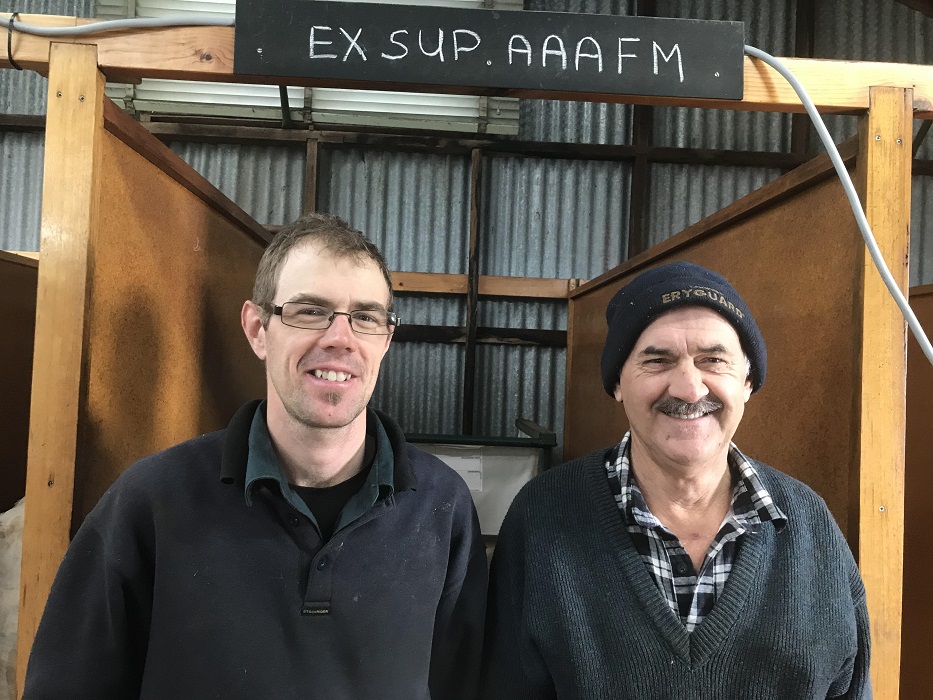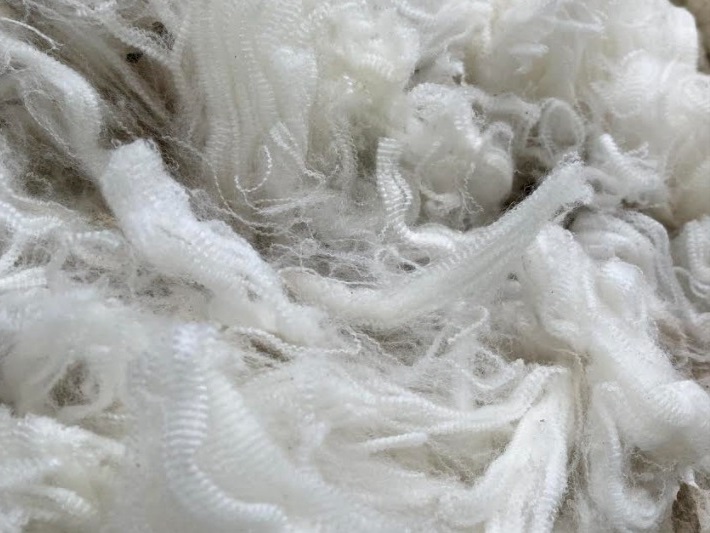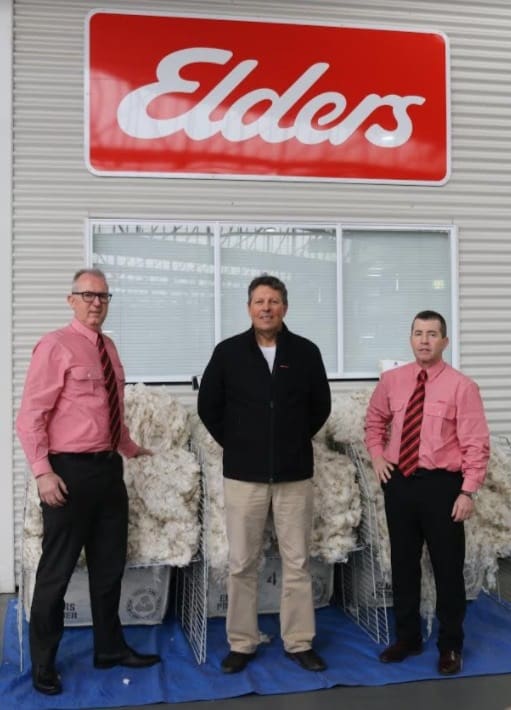
Tarrington superfine wool growers Matthew and Everard Linke. Image – Andrew Howells.
PRODUCING excellent superfine Merino wool is an art, a passion and a livelihood for the Linke family at their Glenholme property at Tarrington in Victoria’s south-west.
This week the Linkes – Everard and his wife Marilyn, and son Matthew – offered their first trio of 1PP bales in Melbourne, prepared to their exacting standards of consistency in quality, diameter, length, tensile strength and yield.
“It is the first time we’ve had three 1PP bales certified in one sale,” Matthew said.
“It was really quite a good growing season and there was plenty of bulk in the wool.”
The 128-146kg bales sold for up to 3586c/kg greasy, or 4801c/kg clean, or about $3800-$5200 a bale, under a special 1PP Pinnacle contract to Italian suit and leisure wear manufacturer Successori Reda. The clip is based on Glenara Merino genetics from Dunkeld.
Elders wool business specialist Sam Wan said 1PP certificates are only issued to bales of Australian superfine wool of superlative quality, style and soundness, prepared in the best possible manner. The Linke family has produced 12 1PP bales since 2015, after being initially encouraged by New England Wool buyer Andrew Raeber.
“He said you’ve got the wool here, you’ve just got to find it,” Everard said.
1PP wool must be fleece style 1 (choice), eligible for the premium AWEX ID of ASF1, be 16.9 microns and finer and 90/100s count visually. The wool must also contain 1pc or less vegetable matter and be at least 70mm in average staple length, unless the wool is significantly finer, when a slightly shorter length is accepted.
1PP starts with Glenara genetics

A closer look at the Linke 1PP wool.
Mr Linke said his father Mervyn started producing superfine wool with Glenara blood sheep in the early 1970s “and we’ve continued on right through.”
“It starts with the genetics,” he said.
“We do our own sheep classing while we shear and Matthew started doing to wool when he left school.”
Mr Linke shears the sheep and Matthew classes the wool initially off the board, and then the fleeces are re-classed from the bin into bales.
“It’s Matthew’s role to double-skirt the fleeces,” Mr Linke said.
“We take the necks, the backs and the hind legs off and then we go round the fleece in second skirt and make sure all the styles are exactly right in that fleece.
“Each fleece is slightly different and you’ve got to identify where those broader areas are – like the hind leg, the neck and the back, and even the broader crimp wool on the wrinkles around the neck,” he said.
“Wool gets more nourished on wrinkles and the back has generally a plainer style wool or be slightly weaker.”
Mr Linke said this year some of the bales were classed down to an average staple length variation of just 5mm to get a low coefficient of variation.
“When we’re classing after shearing it takes a lot of concentration and evenness to get that low average.
“Getting the right length in the fleece starts on the shearing board.
“But if the wool is not prepared right on the table there is no way you can get it.”
It’s experience, but also an art and a passion

With the Linkes’ 1PP bales were Elders wool selling centres manager Simon Hogan, NEW buyer Andrew Raeber, and Elders senior auctioneer and district wool manager Elliot Lindley.
Mr Linke said producing 1PP wool is “probably something you don’t learn overnight”.
“You can’t get it if you haven’t got patience to do the classings.
“After years of experience, it is probably an art first and then it’s a passion,” he said.
“That’s all we know as far as wool goes, we haven’t had any other breeds for those 40 years apart from a few fat lambs on the side.”
Matthew also agreed that 1PP quality wool production came down to experience. Mr Linke said the good season this year produced wool with tensile strengths from the mid-40s-plus in Newtons/kilotex.
“You can do the best in an average year and you think you’ve done a good job, but the season dictates what you actually get.
“It (the clip) was clean and probably one of the best clips we’ve ever had, and according to Andy Raeber, it was one of the best we’ve ever put out.”
NEW buyer Andrew Raeber said the Linke’s latest clip was the best he had seen the Linkes produce in the past 10 years, “on the back of a really good season and brilliant breeding.” He said Matthew Linke’s clip preparation and classing was of the highest standard.
“It was brilliantly classed, he’s a brilliant young up and coming wool grower.
“Not many people get three 1PP bales,” he said.
“They’re fantastic operators.
“They are also members of the Vitale Barberis Canonico Wool Excellence Club,” Mr Raeber said.
Mr Linke said the Successori Reda 1PP contract has given the family the challenge to produce quality wool.
Most of the 1PP wool came from three year-old wethers in the ceased mulesing flock. The first bale in the trio tested at 15.7 micron and sold for 3586c/kg greasy, or 4801c/kg clean, with a yield of 71.6pc, tensile strength of 53N/kt and an average staple length of 76mm. A 16 micron bale sold for 3402c/kg greasy, or 4500c/kg clean, with a yield of 72.4pc, tensile strength of 43N/kt, 83mm length and 8pc CoV. The third bale, of 16.7 micron wool, sold for 2878c/kg greasy, or 3900c/kg clean. The bales’ had a low co-efficient of variation for staple length of 8pc, and vegetable matter content varied from 0.1-0.2pc.
Linkes are perfectionists
Elders district wool manager Andrew Howells said he also described the Linkes as artists in producing wool.
“They are just so particular and perfectionist with everything they do and the amount of patience and work that is required to do it.
“It’s a passion more so than even doing it for the price, it’s just an artistic goal for them,” he said.
“It’s just amazing watching them look for the particular attributes in their wool.”
Mr Howells said normally a co-efficient of variation of 12-15pc in staple length was regarded as good.
“They are getting length variations as low as 6pc CoV and that is absolutely incredible.”
He said the Linke clip’s minimum staple length results of 40N/kt-plus when combined with the low length variation, meant minimal waste for the processor.
“It’s amazing how they’ve classed that all up and separated each particular lot, which is why I refer to them as artists, because with that amount of work and dedication is more than the money, it’s an absolute passion.”
Mr Howells said the Linkes’ management to produce 1PP bales encompassed the feeding of the sheep, the fertilising of pastures, lamb rearing and sheep handling.
“To get that sort of staple strength your management has got to be so good that they haven’t had a worm burden or a sudden change in nutrition – it’s all got to be managed to the Nth degree.”

One of the great privilege’s I have experienced in my lifetime is to have been taken to the Linke family property, ‘Glenholme’, at Tarrington to observe shearing. It is a family enterprise of real artisans. The careful preparation of the clip commences with Everard shearing the sheep, and only at a speed Matthew can sort and class the wool to tight specifications.
But the achievement of producing three bales of 1PP wool with a 56Nkt measurement doesn’t start with shearing. Yes, as Everard Linke admits it is helped by a kind season, but some 11 years ago the Linkes moved from industrial to biological fertilizers. It was Neville Simcock who introduced the Linkes to biological farming and Neville Simcock who introduced me to both the Linke family and biological fertilizers. As the Linke family acknowledged 1PPP wool is a combination of sheep genetics, healthy soils and plants, plus skilful management.
Congratulations Everard, Marilyn and Mathew Linke.